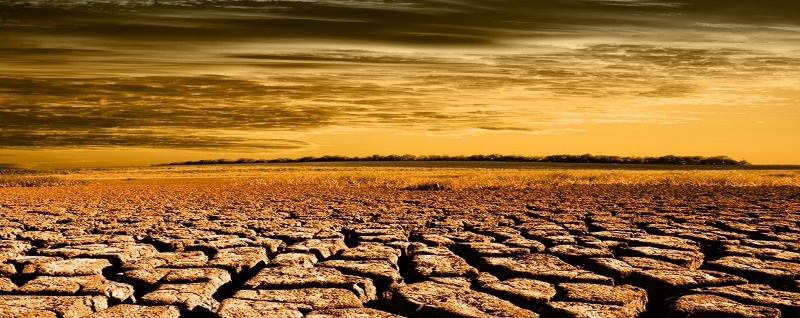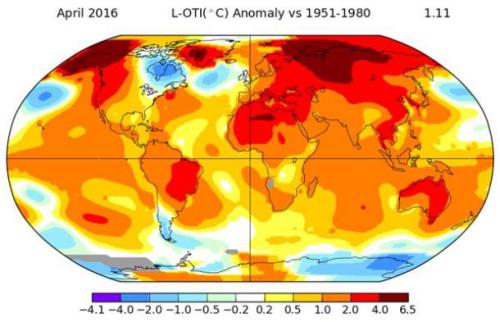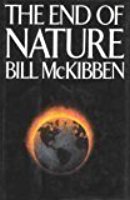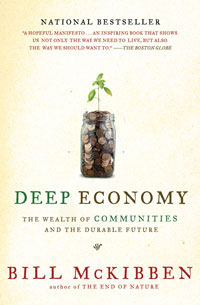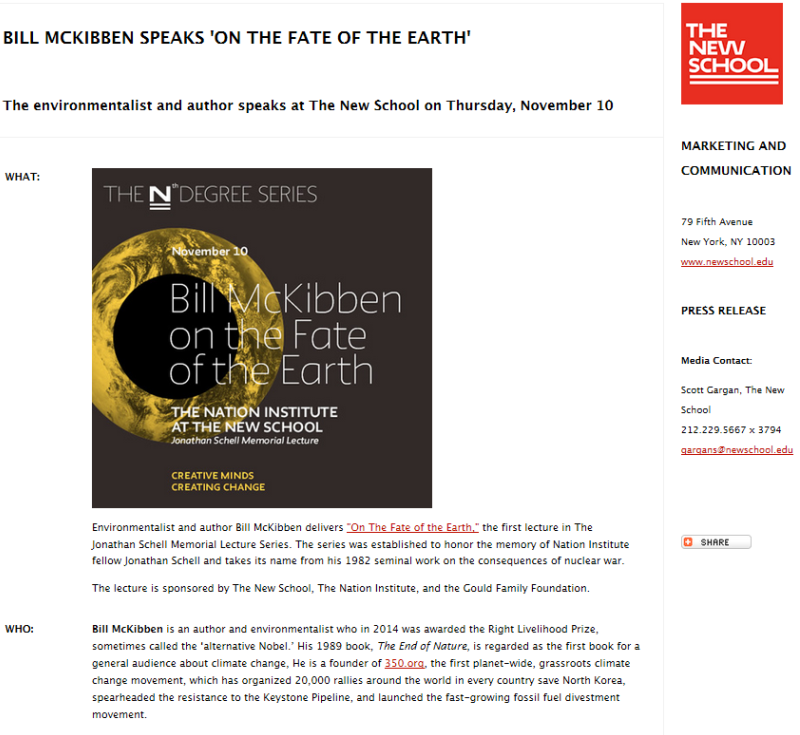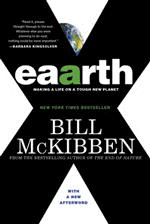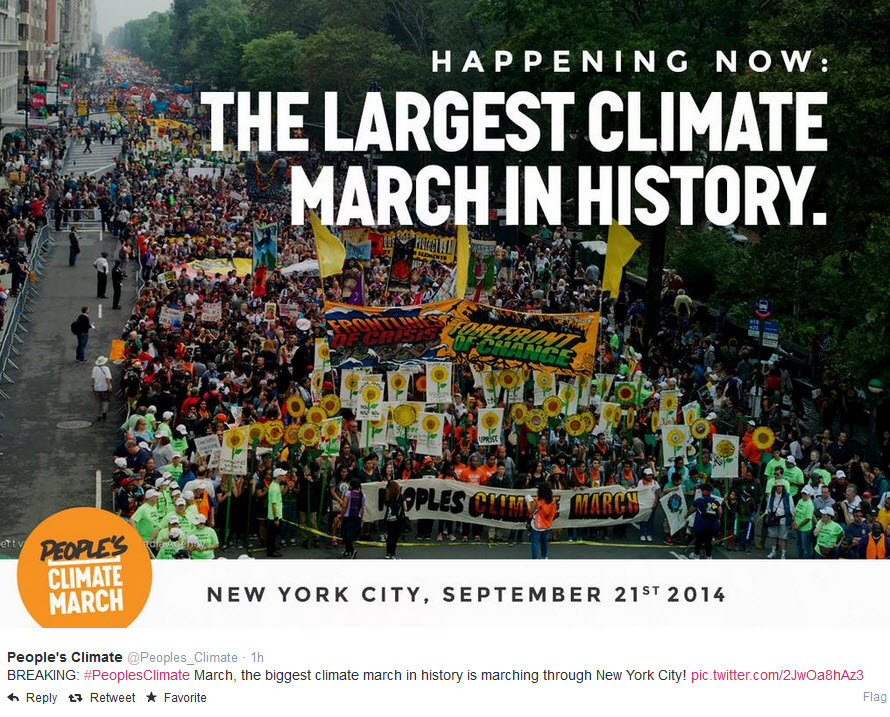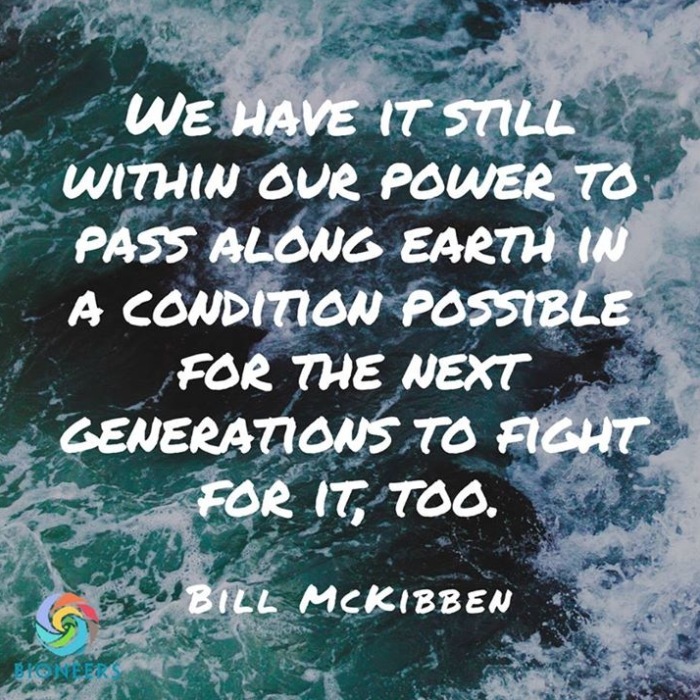Bill McKibben, planet citizen: Difference between revisions
Siterunner (talk | contribs) No edit summary |
Siterunner (talk | contribs) No edit summary |
||
| Line 22: | Line 22: | ||
Bill McKibben is an amazing [http://www.planetcitizen.org planet citizen] and we greatly respect him for his strength of mind and his courage. Looking back to the [http://www.greenpolicy360.net/w/Green_Policy:About GreenPolicy360 Green Institute/GreenPolicy beginnings], Bill was one of the most hard working members of our board of advisors. He was a force at a distance as he traveled in constant motion. His words were powerful, his far-flung work inspirational. Bill was imagining new direction as a [https://www.amazon.com/Bill-McKibben/e/B001H6G9ME?ref=sr_ntt_srch_lnk_2&qid=1556985051&sr=8-2 writer-activist] and imagining what could be and needed to be done to face environmental crisis. | Bill McKibben is an amazing [http://www.planetcitizen.org planet citizen] and we greatly respect him for his strength of mind and his courage. Looking back to the [http://www.greenpolicy360.net/w/Green_Policy:About GreenPolicy360 Green Institute/GreenPolicy beginnings], Bill was one of the most hard working members of our board of advisors. He was a force at a distance as he traveled in constant motion. His words were powerful, his far-flung work inspirational. Bill was imagining new direction as a [https://www.amazon.com/Bill-McKibben/e/B001H6G9ME?ref=sr_ntt_srch_lnk_2&qid=1556985051&sr=8-2 writer-activist] and imagining what could be and needed to be done to face environmental crisis. | ||
This was as | This was in 2007 as a 'Great Recession' started a downward collapse and out of global economic shockwaves came ideas for a new economics. In the UK, a [https://www.greenpolicy360.net/w/Green_New_Deal "Global New Deal"] was rolled out as a way to move beyond recession with a forward-looking green economics plan to confront the crisis of climate change. In the US, the activism of Bill McKibben was envisioning what had to happen to confront the climate crisis. A new organization with global networking was 'brain-stormed' and it soon was launched in 2008 as [http://www.350.org '''350.org'''] | ||
Revision as of 16:47, 4 May 2019
- Time for Planet Citizen Action
Bill McKibben, GreenPolicy360's former adviser, writes of climate change/global warming and the existential threat we all face
It's Not on the Way, It's Here, the Crisis, Our New Climate Reality
Falter: Has the Human Game Begun to Play Itself Out? / Published April 2019 by Henry Holt and Co.
································································································································
SJS / GreenPolicy360 Siterunner:
Bill McKibben is an amazing planet citizen and we greatly respect him for his strength of mind and his courage. Looking back to the GreenPolicy360 Green Institute/GreenPolicy beginnings, Bill was one of the most hard working members of our board of advisors. He was a force at a distance as he traveled in constant motion. His words were powerful, his far-flung work inspirational. Bill was imagining new direction as a writer-activist and imagining what could be and needed to be done to face environmental crisis.
This was in 2007 as a 'Great Recession' started a downward collapse and out of global economic shockwaves came ideas for a new economics. In the UK, a "Global New Deal" was rolled out as a way to move beyond recession with a forward-looking green economics plan to confront the crisis of climate change. In the US, the activism of Bill McKibben was envisioning what had to happen to confront the climate crisis. A new organization with global networking was 'brain-stormed' and it soon was launched in 2008 as 350.org
A tip of our green hat to all planet citizens, adventurers, dreamers and doers who imagine what can be done, step up and act to make a positive difference.
(From Amazon: Bill McKibben is the author of The End of Nature, Deep Economy, and numerous other books. He is the founder of the environmental organizations Step It Up and 350.org, and was among the first to warn of the dangers of global warming.)
(From Wikipedia: William Ernest "Bill" McKibben (born December 8, 1960) is an American environmentalist, author, and journalist who has written extensively on the impact of global warming. He is the Schumann Distinguished Scholar at Middlebury College and leader of the anti-carbon campaign group 350.org. He has authored a dozen books about the environment, including his first, The End of Nature (1989), about climate change. More)
Environmental Writer Turns Words into Action / Via Voice of America (VOA)
Activist launches worldwide campaign to fight climate change / 2008 / https://350.org/about/#history
McKibben was born in 1960 in Lexington, Massachusetts, the birthplace of the American Revolution.
During his summers in high school, McKibben led tours on the Lexington battlefield telling the story of American democracy and freedom. He says the experience taught him a valuable history lesson.
Bill McKibben: "I've never confused dissent with the lack of patriotism; if anything, just the opposite. You know the people I was talking about showed their patriotism by dissenting from big power."
○ ○ ○ ○ ○ ○ ○ ○ ○ ○ ○ ○ ○ ○ ○ ○ ○ ○ ○ ○ ○ ○ ○
Earth Day, 2018, Existential Challenges, Life on Earth
○ ○ ○ ○ ○ ○ ○ ○ ○ ○ ○ ○ ○ ○ ○ ○ ○ ○ ○ ○
Bill McKibben and Bill Moyers Talk
Bill Moyers: Sixteen books of first-rate journalism and now a novel. Your first. Did reality become too much for you?
Bill McKibben: ... I thought maybe it would be OK to indulge my funnier side a little bit, in the service of the resistance to all that’s happening around us.
Moyers: Explaining why you turned not just to fiction but to a fable. Fables are playful. Sometimes the truth goes down easier when it’s more playful.
McKibben: I’ve spent my life living in rural America, some of it in blue state Vermont, some of it in red state upstate New York. They’re quite alike in many ways. And quite wonderful. It’s important that even in an urbanized and suburbanized country, we continue to take rural America seriously. And the thing that makes Vermont in particular so special, and I hope this book captures some of it, is the basic underlying civility of its political life. That’s rooted in the town meeting. Each of the towns in Vermont governs itself...
McKibben: The consumer culture in general has washed over our civilization. And one result is that neighbors like these became optional in America. For the last 50 years, if you’ve had a credit card and some access to money, you don’t really need neighbors around you. And as a result, they dwindled. The average American has half as many close friends as they did in 1950. Three quarters of Americans don’t know their next-door neighbor. They may know their name, but they have no real relationship with them. That’s an utterly new place for human beings to find themselves in—I mean, we’re a socially evolved primate. It wasn’t that many generations ago that we were sitting on the savannah picking lice out of each other’s fur. It’s got to be one of the reasons that we’re going so crazy right now.
McKibben: I’m afraid rebellion comes naturally to me. You mentioned Concord and Lexington in Massachusetts. I grew up in Lexington. And I used to give summer tours of the Battle Green, the “birthplace of American liberty.” Really, Lexington marked the start of the worldwide battle against imperialism and colonialism, and I would put on my tricorn hat and go out and tell tourists about the beginning of that fight. So I’ve never in my life confused dissent with a lack of patriotism. Just the opposite, in many ways.
McKibben: No taxation without representation! How many of us feel truly represented? One of the ironies of this book is that Vermont in some ways should be the last place to secede from the Union. We come closer to having an effective democracy than anyplace. There’s 600,000 of us and we have two senators—Sanders and Leahy—and we can see them in the grocery store and call them on the phone. I can’t imagine why California settles for only two senators. It’s the sixth-largest economy in the world. It’s got 40 million people. And two senators, just as we have in Vermont. The idea of one man, one vote is increasingly crazy in this country, and so is the malignant effect of money on our political life, as you have been reporting a long time now.
McKibben: ... (O)ver the last 10 years. I’ve been a part of it with the organization 350.org, fighting global warming, and now in the resistance that’s sprung up in the last year since Donald Trump took over. That’s been the one heartening thing about this year: the antibodies have assembled themselves to try and fight off the fever that America’s now in. I’m no Pollyanna, so I don’t know if it’s going to work or not.
Moyers: Let’s pause right here and talk about this present moment as reality, not fable. Here’s what your story prompts me to ask: When people realize the current order of things no longer works and the institutions of government and society are failing to fix them—failing to solve the problems democracy creates for itself—what options do they have?
McKibben: Well, I don’t think we’re in a place where rebellion in the sense of the American Revolution works anymore. One of the reasons that I’m a big advocate of nonviolence is that it’s the only thing that makes sense...
McKibben: It’s harder with many other things. The fight around climate change, which I’ve spent my life on, is somewhat more difficult because no one makes trillions of dollars a year being a bigot, and that’s how much the fossil-fuel industry pulls in pumping carbon into the air. But the principle is the same, I think.
Moyers: For me the question now is how much time do we have? When it comes to global warming, all signs suggest we are running out of time.
McKibben: The question of time is the question that haunts me. I remain optimistic enough to think that in general human beings will figure out the right thing to do eventually, and Americans will somehow get back on course. Of course, there’ll be a lot of damage done in the meantime. But with climate change in particular—the gravest of the problems we face—time is the one thing we don’t have. It’s the only problem we’ve ever had that came with a time limit. And if we don’t solve it soon, we don’t solve it. Our governments so far have not proven capable of dealing with this question. They simply haven’t been able to shake off the self-interest and massive power of the fossil-fuel industry. It’s going to take a lot of work and a lot of effort to get us onto renewable energy quickly and everywhere. It’s doable technically; the question is whether it’s doable politically or not. There I don’t know.
Moyers: You’ve said that winning slowly in this fight —
McKibben: Winning slowly is another way of losing. Look, we’re screwing up our health care system again right now. That’s going to cause grave trouble for people over the next five, 10 years. There are going to be lots of people who die, lots of people who are sick, lots of people who go bankrupt. It’s going to be horrible. But 10 years from now it will not be harder to solve the problem because you ignored it for those 10 years. It won’t have changed into some completely other problem. With climate change, that’s not true. As each year passes, we move past certain physical tipping points that make it impossible to recover large parts of the world that we have known.
Moyers: Just last week we got the National Climate Assessment Report, which says we’re now living in the warmest period in the history of modern civilization, and that the average global concentration of carbon dioxide has surged to the highest level in approximately 3 million years. Three million years!
McKibben: Three million years, and the last time there was this much CO2 in the atmosphere, the temperature of the planet settled several degrees higher, which results in approximately a 20-meter rise in the level of the oceans. Times Square is 16 meters above sea level, just to give you a little bit of reference. We’re playing with forces so enormous now...
As you know, I wrote the first book about climate change almost 30 years ago —
Moyers: 1989.
"End of Nature" by Bill McKibben
"The End of Nature" established McKibben as an environmental writer and he has written a dozen more books addressing climate change from many different angles...
McKibben: When I started writing about it, climate change was still theoretical and abstract. Now it bludgeons you weekly. Think about the last eight weeks and confine yourself to the small percent of the planet that’s covered by the United States. We had the greatest rainstorm in American history. Hurricane Harvey came ashore in your old state of Texas and dropped 54 inches in parts of Houston. That’s more rain than we’ve ever seen at one time in the United States. Hurricane Irma, on its heels, is the longest ever recorded on the planet—longest storm with a wind speed above 185 miles an hour. Maria comes to Puerto Rico 10 days after that, it knocks an entire island 30 years back in its development. It’s going to be that long before they get back to where they were in August. And then look at what happens in California after the hottest and driest summer ever recorded there. Napa and Sonoma, which are as close as you get to our definition of what constitutes the good life — you know, prosperous beautiful communities, surrounded by big buckets of wine — Napa and Sonoma burn in the course of hours. People flee for their lives...
Moyers: I don’t think any reader who knows you will put this book down without asking what does Bill McKibben think we can do now, given the folly of our government? What can we do about the fate of the Earth as the planet gets hotter and the United States turns thumbs down on responding. As you just said, you spent the last 30 years trying to warn us about the threat. You’ve written important books, you’ve produced stellar journalism, you’ve traveled and lectured, protested and petitioned. You’ve organized and led marches and got yourself arrested outside Barack Obama’s White House. Indeed, it wasn’t until things like that happened that Obama finally woke up and started coming up with policies to fight global warming. It took that long to move a progressive Democrat. Now we have have a president surrounded by like-minded cronies and supported by a Congress controlled by Republicans, a party that seems absolutely willing to let the Earth burn for profit. What would you have us do against such counter-resistance?
McKibben: We can’t make any progress in DC, at least for now. One of the things that we have to do in the moment is make a lot of progress in the places we can: in local communities, in states and cities where we have enough political purchase to get things done. And really that’s a larger span of places than you would think.
○ ○ ○ ○ ○ ○ ○ ○ ○ ○ ○ ○ ○ ○ ○ ○ ○
The Question I Get Asked the Most
Via Green Builder
The questions come after talks, on twitter, in the days' incoming tide of email—sometimes even in old-fashioned letters that arrive in envelopes. The most common one by far is also the simplest: "What can I do?" I bet I've been asked it 10,000 times by now...
"What can I do to make a difference?"
It's the right question or almost: It implies an eagerness to act and action is what we need. But my answer to it has changed over the years, as the science of global warming has shifted. I find, in fact, that I'm now saying almost the opposite of what I said three decades ago.
Then — when I was 27 and writing the first book on climate change — I was fairly self-obsessed (perhaps age appropriately). And it looked like we had some time: No climate scientist in the late 1980s thought that by 2016 we'd already be seeing massive Arctic ice melt. So it made sense for everyone to think about the changes they could make in their own lives that, over time, would add up to significant change. In The End of Nature, I described how my wife and I had tried to "prune and snip our desires," how instead of taking long vacation trips by car we rode our bikes in the road, how we grew more of our own food, how we "tried not to think about how much we'd like a baby."
Some of these changes we've maintained — we still ride our bikes, and I haven't been on a vacation in a very long time. Some we modified—thank God we decided to have a child, who turned out to be the joy of our life. And some I've abandoned: I've spent much of the last decade in frenetic travel, much of it on airplanes. That's because, over time, it became clear to me that there's a problem with the question "What can I do."
The problem is the word "I." By ourselves, there's not much we can do. Yes, my roof is covered with solar panels and I drive a plug-in car that draws its power from those panels, and yes our hot water is heated by the sun, and yes we eat low on the food chain and close to home. I'm glad we do all those things, and I think everyone should do them, and I no longer try to fool myself that they will solve climate change.
Because the science has changed and with it our understanding of the necessary politics and economics of survival. Climate change is coming far faster than people anticipated even a couple of decades ago. 2016 is smashing the temperature records set in 2015 which smashed the records set in 2014; some of the world's largest physical features (giant coral reefs, vast river deltas) are starting to die off or disappear. Drought does damage daily; hundred-year floods come every other spring. In the last 18 months we've seen the highest wind speeds ever recorded in many of the world's ocean basins. In Basra Iraq — not far from the biblical Garden of Eden — the temperature hit 129 Fahrenheit this summer, the highest reliably recorded temperature ever and right at the limit of human tolerance. July and August were not just the hottest months ever recorded, they were, according to most climatologists, the hottest months in the entire history of human civilization. The most common phrase I hear from scientists is "faster than anticipated." Sometime in the last few years we left behind the Holocene, the 10,000 year period of benign climatic stability that marked the rise of human civilization. We're in something new now — something new and frightening.
Against all that, one's Prius is a gesture. A lovely gesture and one that everyone should emulate, but a gesture. Ditto riding the bike or eating vegan or whatever one's particular point of pride. North Americans are very used to thinking of themselves as individuals, but as individuals we are powerless to alter the trajectory of climate change in a meaningful manner. The five or ten percent of us who will be moved to really act (and that's all who ever act on any subject) can't cut the carbon in the atmosphere by more than five or ten percent by those actions.
The right question is "What can we do to make a difference?"
- ○ ○ ○ ○ ○ ○ ○ ○ ○ ○
Friend & Early Green Institute Advisor
○
Sept 2016 / Recalculating the Climate Math
Follow Bill on Twitter
- https://twitter.com/billmckibben
- https://twitter.com/hashtag/BillMcKibben?src=hash
- https://twitter.com/350
- https://twitter.com/hashtag/350org?src=hash
The Global Warming Reader, edited by Bill McKibben
○ ○ ○ ○ ○ ○ ○ ○
Bill McKibben
SJS / GreenPolicy360 Siterunner: On behalf of planet citizens within the global, open source Wiki networking community, GreenPolicy360 would like to take this time, following the historic next-step accomplishments of the 2015 Paris climate summit, to send multi-language "greening our blue planet" thanks to our former advisor, Bill McKibben.
Back when we, at Green Institute with our GreenPolicy project start-up, we approached Bill to join our advisor group and although he was deeply involved in his "Deep Economy" book and in initial phases of his own start-up project with the climate change/global warming movement group that became 350.org, he agreed to add his name to the Green Institute and share his thoughts as we conceived sharing "best green practices" via global online networking.
May 24, 2016, a moment's reflection on 350.org founder Bill McKibben
I personally want to thank Bill, a voice of our generation who feels deeply and acts with persistence and foresight to advance the critical, even life-enabling, work that all of us in the larger green, environmental movement are attempting. The climate change work is opening eyes now across the globe, in every country, every community.
Thank you Bill.
You are a true planet citizen.
○ ○ ○ ○ ○ ○
○ ○ ○ ○ ○ ○ ○ ○ ○ ○
Wikipedia bio of Citizen McKibben
January 2016
William "Bill" McKibben
...In 2009, he led 350.org's organization of 5,200 simultaneous demonstrations in 181 countries. In 2010, McKibben and 350.org conceived the Global Work Party, which convened more than 7,000 events in 188 countries as he had told a large gathering at Warren Wilson College shortly before the event. In December 2010, 350.org coordinated a planet-scale art project, with many of the 20 works visible from satellites. In 2011 and 2012 he led the environmental campaign against the proposed Keystone XL pipeline project and spent three days in jail in Washington, D.C. It was one of the largest civil disobedience actions in America for decades. Two weeks later he was inducted into the literature section of the American Academy of Arts and Sciences.
He was awarded the Gandhi Peace Award in 2013. Foreign Policy magazine named him to its inaugural list of the 100 most important global thinkers in 2009 and MSN named him one of the dozen most influential men of 2009. In 2010, the Boston Globe called him "probably the nation's leading environmentalist and Time magazine book reviewer Bryan Walsh described him as "the world's best green journalist".
Early life
McKibben grew up in the Boston suburb of Lexington, Massachusetts, where he attended high school. His father, who was arrested in 1971 during a protest in support of Vietnam veterans against the war, had written for Business Week and was business editor at The Boston Globe in 1980. As a high school student McKibben wrote for the local paper and participated in statewide debate competitions. Entering Harvard University in 1978, he became editor of The Harvard Crimson. In 1980, following United States presidential election of Ronald Reagan, he determined to dedicate his life to the environmental cause.
Graduating in 1982, he worked for five years for The New Yorker as a staff writer writing much of the Talk of the Town column from 1982 to early 1987. He lived simply, sharing an apartment with David Edelstein, the film critic, and found solace in the Gospel of Matthew. He became an advocate of nonviolent resistance. While doing a story on the homeless he lived on the streets; there he met his wife, Sue Halpern, who was working as a homeless advocate. In 1987 he quit The New Yorker when its longtime editor William Shawn was forced out of his job, and soon moved to the Adirondack Mountains of upstate New York where he worked as a freelance writer.
Writing
McKibben began working as a freelance writer at about the same time that climate change appeared on the public agenda in 1988 after the hot summer and Yellowstone fires of 1988 and testimony by James Hansen before the United States Senate Committee on Energy and Natural Resources in June, 1988. Dr. Hansen of the National Aeronautics and Space Administration told a Congressional committee that it was 99 percent certain that the warming trend was not a natural variation but was caused by a buildup of carbon dioxide and other artificial gases in the atmosphere.
His first contribution to the debate was a brief list of literature on the subject and commentary published December, 1988 in The New York Review of Books and a question, "Is the World Getting Hotter?"
He is a frequent contributor to various publications including The New York Times; The Atlantic; Harper's; Orion magazine; Mother Jones (magazine); The American Prospect; The New York Review of Books; Granta; National Geographic (magazine); Rolling Stone, Adbusters, and Outside (magazine). He is also a board member at and contributor to Grist Magazine.
His first book, The End of Nature, was published in 1989 by Random House after being serialized in The New Yorker. Described by Ray Murphy of the Boston Globe as a "righteous jeremiad," the book excited much critical comment, pro and con; was for many people their first introduction to the question of climate change. "Gentle climate warrior turns up the heat", Toronto Star, 5 July 2015 and the inspiration for a great deal of writing and publishing by others. It has been printed in more than 20 languages. Several editions have come out in the United States, including an updated version published in 2006.
His next book, The Age of Missing Information, was published in 1992. It is an account of an experiment in which McKibben collected everything that came across the 100 channels of cable TV on the Fairfax, Virginia, system (at the time among the nation's largest) for a single day. He spent a year watching the 2,400 hours of videotape, and then compared it to a day spent on the mountaintop near his home. This book has been widely used in colleges and high schools and was reissued in a new edition in 2006.
Subsequent books include Hope, Human and Wild, about Curitiba, Brazil and Kerala, India, which he cites as examples of people living more lightly on the earth; The Comforting Whirlwind: God, Job, and the Scale of Creation, which is about the Book of Job and the environment; Maybe One, about human population; Long Distance: A Year of Living Strenuously, about a year spent training for endurance events at an elite level; and Enough, about what he sees as the existential dangers of genetic engineering and nanotechnology. Speaking about Long Distance at the Cambridge Forum, McKibben cited the work of Mihaly Csikszentmihalyi and Csikszentmihalyi's idea of "Flow (psychology)" relative to feelings he, McKibben, had had — "taking a break from saving the world", he joked — as he immersed in cross-country skiing competitions.
Wandering Home' is about a long solo hiking trip from his current home in the mountains east of Lake Champlain in Ripton, Vermont, back to his longtime neighborhood of the Adirondacks. His book, Deep Economy: the Wealth of Communities and the Durable Future, published in March 2007, was a national bestseller. It addresses what the author sees as shortcomings of the growth economy and envisions a transition to more local-scale enterprise.
In the fall of 2007 he published, with the other members of his Step It Up team, Fight Global Warming Now, a handbook for activists trying to organize their local communities. In 2008 came The Bill McKibben Reader: Pieces from an Active Life, a collection of essays spanning his career. Also in 2008, the Library of America published "American Earth," an anthology of American environmental writing since Thoreau edited by McKibben.
In 2010 he published another national bestseller, Eaarth: Making a Life on a Tough New Planet--"Eaarth" is NOT a typo -- an account of the rapid onset of climate change. It was excerpted in Scientific American.
Some of his work has been extremely popular; an article in Rolling Stone in July 2012 received over 125,000 likes on Facebook, 14,000 tweets, and 5,000 comments - Global Warming's Terrifying New Math: Three simple numbers that add up to global catastrophe - and that make clear who the real enemy is
Environmental campaigns
Step It Up
Step It Up 2007 was a nationwide Environmentalism campaign started by McKibben to demand action on global warming by the U.S. Congress.
In late summer 2006 he helped lead a five-day walk across Vermont to call for action on global warming. Beginning in January 2007, he founded Step It Up 2007, which organized rallies in hundreds of American cities and towns on April 14, 2007 to demand that Congress enact curbs on carbon emissions by 80 percent by 2050. The campaign quickly won widespread support from a wide variety of environmental, student, and religious groups.
In August 2007 McKibben announced Step It Up 2, to take place November 3, 2007. In addition to the 80% by 2050 slogan from the first campaign, the second adds "10% reduction of emissions in three years ("Hit the Ground Running"), a moratorium on new coal-fired power plants, and a Green Jobs Corps to help fix homes and businesses so those targets can be met" (called "Green Jobs Now, and No New Coal").
350.org -- https://www.greenpolicy360.net/w/350.org
In the wake of Step It Up's achievements, the same team announced a new campaign in March 2008 called 350.org. The organizing effort, aimed at the entire globe, drew its name from climate scientist James E. Hansen's contention earlier that winter that any atmospheric concentration of carbon dioxide (CO2) above 350 parts per million was unsafe. "If humanity wishes to preserve a planet similar to that on which civilization developed and to which life on Earth is adapted, paleoclimate evidence and ongoing climate change suggest that CO2 will need to be reduced from its current 385 ppm to at most 350 ppm, but likely less than that." Hansen et al. stated in the Abstract to their paper. Hansen, J., Mki. Sato, P. Kharecha, D. Beerling, R. Berner, V. Masson-Delmotte, M. Pagani, M. Raymo, D.L. Royer, and J.C. Zachos, 2008: Target atmospheric CO2: Where should humanity aim? Open Atmospheric Science Journal, 2, 217-231
350.org, which has offices and organizers in North America, Europe, Asia, Africa and South America, attempted to spread that 350 number in advance of international climate meetings in December 2009 in Copenhagen. It was widely covered in the media. On Oct. 24, 2009, it coordinated more than 5,200 demonstrations in 181 countries, and was widely lauded for its creative use of internet tools, with the website Critical Mass declaring that it was "one of the strongest examples of social media optimization the world has ever seen." Foreign Policy magazine called it "the largest ever global coordinated rally of any kind."
Subsequently the organization continued its work, with the Global Work Party on 10/10/10 (10 October 2010).
Keystone XL
McKibben is the lead environmentalist against the proposed Canadian-U.S. Keystone XL pipeline project.
People's Climate March
On May 21, 2014, McKibben published an article on the website of Rolling Stone magazine (later appearing in the magazine's print issue of June 5), titled "A Call to Arms", which invited readers to a major climate march (later dubbed the People's Climate March in New York City on the weekend of September 20–21. Both dates were mentioned in the article because the actual date of the march was uncertain at the time of publication. After negotiations with New York City authorities, event planners chose Sunday, September 21 as the date. In the article, McKibben calls climate change "the biggest crisis our civilization has ever faced", and predicts that the march will be "the largest demonstration yet of human resolve in the face of climate change".
○ ○ ○ ○ ○
Awards
McKibben has been awarded both a Guggenheim Fellowship (1993) and a Lyndhurst Fellowship. He won a Lannan Literary Award for Nonfiction in 2000. In 2010, Utne Reader magazine listed McKibben as one of the "25 Visionaries Who Are Changing Your World." He has honorary degrees from Whittier College, Marlboro College, Colgate University, the State University of New York, Sterling College (Vermont), Green Mountain College, Unity College (Maine), and Lebanon Valley College. In 2010 he won the Puffin/Nation Prize for Creative Citizenship for his work with 350.org. In 2013, he won the international environment and development prize. In 2014, he and 350.org were awarded the Right Livelihood Award"...for mobilising growing popular support in the USA and around the world for strong action to counter the threat of global climate change".
Personal life
McKibben resides in Ripton, Vermont with his wife, writer Sue Halpern. Their only child, a daughter named Sophie, was born in 1993 in Glens Falls, New York. He is a Schumann Distinguished Scholar at Middlebury College, where he also directs the Middlebury Fellowships in Environmental Journalism. McKibben is also a fellow at the Post Carbon Institute. McKibben is a long-time Methodist.
Books
- The End of Nature (1989) ISBN 0-385-41604-0
- The Age of Missing Information (1992) ISBN 0-394-58933-5
- Hope, Human and Wild: True Stories of Living Lightly on the Earth (1995) ISBN 0-316-56064-2
- Maybe One: A Personal and Environmental Argument for Single Child Families (1998) ISBN 0-684-85281-0
- Hundred Dollar Holiday (1998) ISBN 0-684-85595-X
- Long Distance: Testing the Limits of Body and Spirit in a Year of Living Strenuously (2001) ISBN 0-452-28270-5
- Enough: Staying Human in an Engineered Age (2003) ISBN 0-8050-7096-6
- Wandering Home (2005) ISBN 0-609-61073-2
- The Comforting Whirlwind : God, Job, and the Scale of Creation (2005) ISBN 1-56101-234-3
- Deep Economy: The Wealth of Communities and the Durable Future (2007) ISBN 0-8050-7626-3
- Fight Global Warming Now: The Handbook for Taking Action in Your Community (2007)
- The Bill McKibben Reader: Pieces from an Active Life (2008) ISBN 9780805076271
- American Earth: Environmental Writing Since Thoreau (edited) (2008) ISBN 9781598530209
- Eaarth: Making a Life on a Tough New Planet (2010) ISBN 978-0-8050-9056-7
- The Global Warming Reader (2011) ISBN 978-1-935928-36-2
- Oil and Honey: The Education of an Unlikely Activist (Times Books, 2013) ISBN 9780805092844
○ ○ ○ ○ ○ ○ ○ ○
External links
Review of Eaarth: Making a Life on a Tough New Planet
@Amazon/Comments on Deep Economy
Keystone: How Bill McKibben Turned a Pipeline into an Environmental Rallying Point
Bill McKibben's Battle Against the Keystone XL Pipeline
○
https://www.greenpolicy360.net/w/File:People_Climate_March_Sept._21st_Sunday_afternoon.jpg
○ ○ ○ ○ ○ ○ ○ ○ ○ ○ ○ ○ ○ ○
Global Work Party (2010)
Global Work Party
- Let's get to work to stop climate change
- Find an event near you
- Top 10 ideas for activities
- Register your own event!
- Background - 13 July, 2010
- We're teaming up with 350.org and a global coalition of folks doing something about climate change to create a global day of action: the 10/10/10 Work Party.
- Help us make October 10th the biggest single day of action against climate change that the world has ever seen.
- Thanks to the folks at 350.org for this information about how to register your event.
Top 10 ideas for activities
Have ideas to contribute to this list? E-mail them to [email protected]
- 1 Organize a street party in your neighborhood and invite experts to teach your community about ways on how you can decrease a household’s carbon footprint.
Here is a list of suggested workshops and tips on organizing one:
Workshop on how families can maximize the potential electricity savings at home. From smart power use, avoiding energy waste and structural or design changes. Ask your guests to share what they’ve done at home.
Workshop on bicycle safety and maintenance. Get your local bicycle shop to co-host the event by providing a mechanic or ask avid-cyclists in your neighborhood if they’re interested to be one.
Workshop on growing your own food and making organic compost. Invite your local garden center to talk about which plants are suitable to your area’s weather and endemic to the place.
- 2 Get your community to switch to green energy
Sometimes, it’s just a matter of letting people know that they have a choice! Some tips in getting your community to switch:
Research all the renewable energy providers in your area and make a leaflet about it. Include advice on smart energy usage.
It’s time to chat with your neighbor! Knock on their doors; having a face-to-face conversation is a great way for people to take on your challenge.
If the energy providers in your area don’t offer green energy – start a petition to get your community to demand them to do so.
- 3 Veggie dinner or picnic
Organize a dinner or picnic with friends and family and serve only yummy vegetarian food. By the end of the dinner, get them to commit to go meat-free at least 1 day a week.
Remember to opt for local and organic ingredients
- 4 Mass Bike Riding
Gather hundreds of friends and friends of friends for a mass bike ride to show how a car-free community could look like. If your area doesn’t have the proper infrastructure to make cycling safe and convenient, get your school or office to install bike racks. Also ask your local government to designate more bike lanes in your community.
- 5 Deliver a message about dirty fuels to your local government
If you have a local dirty power plant, take some photos of the facility and deliver them to your local government. Tell your leader about the risks this power plant represents to the community and to the planet. Remind them that what your community need is an Energy [R]evolution.
- 6 Tell our leaders to “get to work” for you, not dirty energy companies
Research how much money your local representative have received from dirty energy companies. Deliver giant price tags or checks to politicians that say how much dirty energy money they’ve received. Remind them that what their voters want is an Energy [R]evolution.
- 7 Organize a party demonstrating energy solutions to show your leaders that you want an Energy [R]evolution in your community. Some of the things you can do are:
Gather lots of people and go to a dirty energy facility near your home Hold mini wind turbines to show the contrast between clean and dirty energy. Set up an exhibit area featuring solar-powered lamps, solar cookers, solar-powered charging stations for laptops and mobile phone.
- 8 Put Solar On It
Ask by letter, phone, email or personally your local politician whether they will install solar energy and/or hot water systems on their roof on the Energy [R]evolution work party. If they agree, great! If they don’t, you could pool community money to buy them one, and deliver it to the office. Ask them to pay the tab after they accept it!
- 9 Plant a tree in front of a dirty energy power plant or at the site of a proposed plant.
Better yet, gather 100 people and plant 100 trees or a thousand! Do your homework first to make sure you find a spot where you can do this legally. Your local garden center might be able to donate some trees and teach you the best way to plant them. Check out the status of the trees after you’ve planted it.
- 10 Conduct an energy audit at your local government representative’s office and get them to support an Energy [R]evolution.
Get them to choose a green energy provider to power the building or implementing smart ways on reducing greenhouse gas emissions, or commit to a renewable energy source for your community instead of hosting dirty energy such as coal, oil or nuclear power.
○
○
- Anthropocene
- Atmospheric Science
- Bioneers
- Citizen Science
- Climate Change
- Climate Policy
- Desertification
- Earth Observations
- Earth360
- Earth Science
- Ecology Studies
- Environmental Protection
- Environmental Security
- Extinction
- Global Warming
- Green Best Practices
- Green Networking
- Green Politics
- Natural Resources
- Ocean Science
- Planet Citizen
- Renewable Energy
- Resilience
- Sea-Level Rise & Mitigation
- Sustainability Policies
- Whole Earth
